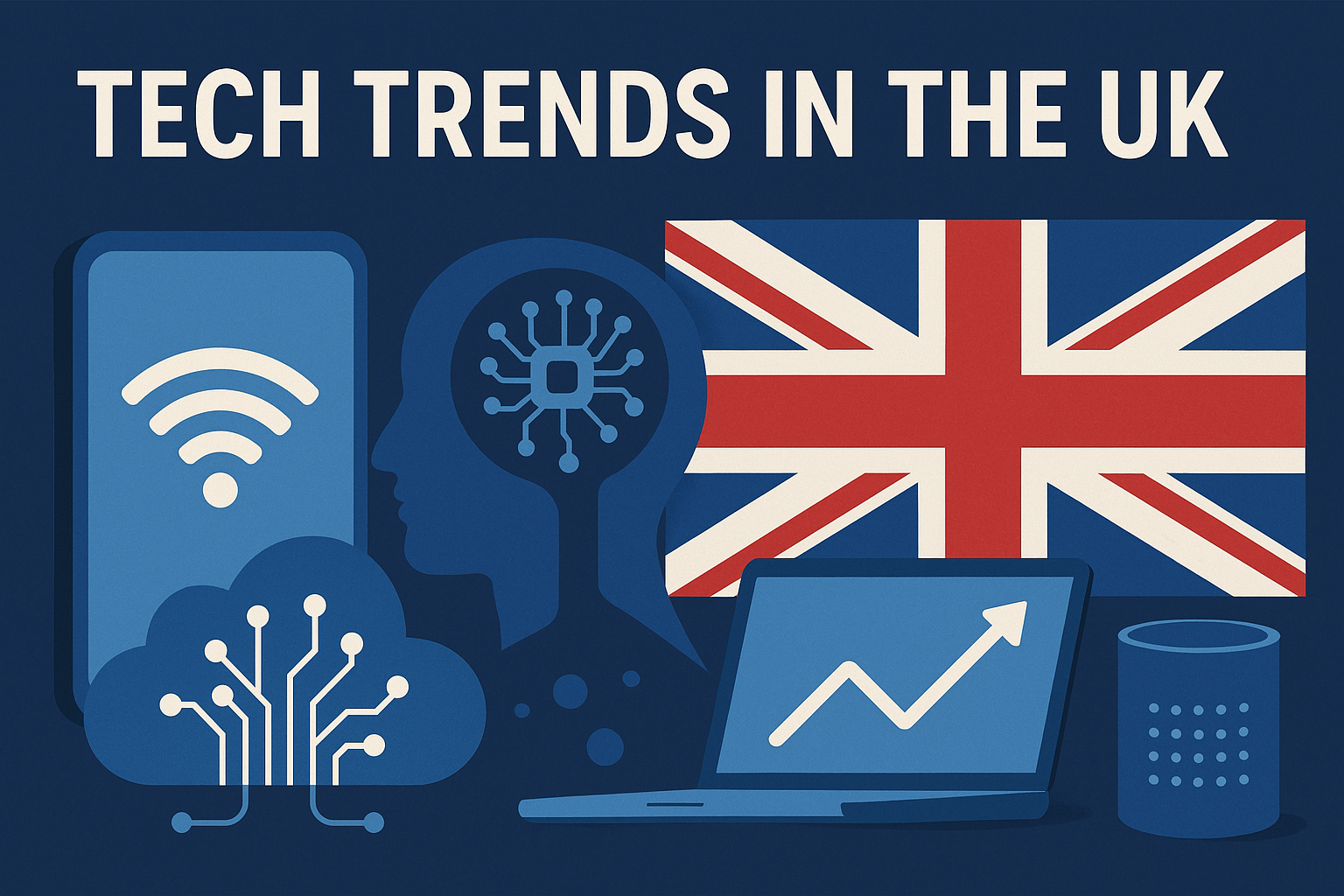Current Technology Trends in the UK: A 2025 Perspective
The United Kingdom continues to stand at the forefront of global technological innovation, with 2025 marking a pivotal year characterized by groundbreaking advancements and strategic investments across various tech sectors. From artificial intelligence (AI) to cybersecurity, quantum computing, and legislative initiatives, the UK’s tech landscape is evolving rapidly, shaped by a blend of industry dynamism and robust governmental support.
Dominance and Expansion of Artificial Intelligence
Artificial intelligence reigns supreme in the UK’s technology arena today, making remarkable strides not only as a powerful tool but also as an autonomous agent transforming diverse industries. The phenomenon of “agentification” illustrates this progression, where AI systems evolve from performing isolated tasks to coordinating as specialized, interconnected agents capable of managing complex operations such as supply chain logistics with minimal human intervention. Experts predict the emergence of a “Super Agent” that orchestrates multiple AI systems to optimize their interactions, potentially revolutionizing sectors including healthcare, public services, and manufacturing by unlocking unprecedented efficiency and innovation (Ola Jader, 2024).
Concurrently, the UK government is intent on embedding AI within a sound regulatory framework. The Labour government, elected with a manifesto emphasizing binding AI regulation, aligns with initiatives such as the Department for Science, Innovation and Technology’s (DSIT) policy “Assuring a Responsible Future for AI,” advocating accountability, transparency, safety, and societal benefit principles. This dual approach of encouraging innovation while instituting ethical oversight reflects a mature strategy to manage AI’s transformative potential responsibly (Ola Jader, 2024).
Legislative Focus: Cyber Security and Data Utilization Bills
With technology’s rise comes the imperative need for robust governance, prompting significant legislative developments anticipated in 2025. Two notable bills—the Cyber Security and Resilience Bill and the Data Use and Access Bill—are poised to reshape how technology is governed across the UK.
The Cyber Security and Resilience Bill aims to strengthen defenses against escalating cyber threats, particularly from state-sponsored actors targeting critical infrastructure. By expanding regulatory scope, enhancing oversight, and mandating incident reporting, the bill addresses vulnerabilities in an increasingly digitized economy and reinforces national security measures (Ola Jader, 2024).
Equally impactful is the Data Use and Access Bill, designed to propel economic growth and improve public services by facilitating better data sharing, especially within entities like the NHS and law enforcement. By alleviating administrative burdens while safeguarding privacy and security, this bill envisages a more innovative and efficient digital ecosystem, unlocking new possibilities for fintech, open banking, and digital verification technologies (Ola Jader, 2024).
Cybersecurity: Navigating New Threats and Opportunities
Cybersecurity stands as a paramount concern within the UK’s tech landscape. The dual role of AI in this sphere—both a tool leveraged by malicious actors to launch sophisticated attacks and an asset for developing enhanced AI-based defense systems—illustrates the complex cyber environment the UK must navigate.
Geopolitical dynamics exacerbate these challenges, with warnings regarding threats from actors linked to Russia, Iran, and China emphasizing the urgency of strengthening cyber resilience. This geopolitical context places cybersecurity at the center of national policy, necessitating investments in advanced threat detection automation, resilient encryption methods, and post-quantum cryptography to future-proof the UK’s digital infrastructure (Ola Jader, 2024).
Workforce Evolution: Skills, Culture and Inclusivity
The rapid advancement of technology mandates a corresponding evolution in workforce capabilities. The UK is poised for a cultural shift, prioritizing continuous learning, ethical responsibility, and inclusivity across its tech ecosystem. Building trust in AI and other emerging technologies will be fundamental to harnessing their potential fully (Ola Jader, 2024).
Efforts to enhance digital skills are manifest in initiatives like the Civil Service Digital Skills Program, which focuses on cybersecurity, data analytics, and AI literacy. Emphasizing societal equity, upskilling programs and digital inclusion strategies seek to bridge skills gaps, reflecting a holistic vision to align workforce development with technology evolution. This approach also aims to attract younger tech-savvy talent by positioning public-sector tech roles as forward-thinking and purpose-driven (Ola Jader, 2024).
Quantum Computing and Next-Generation Supply Chains
Quantum computing continues to command attention as the UK invests in technologies with the potential to outperform classical supercomputers by 2035, fostering breakthroughs in medicine, climate modeling, and clean energy. Correspondingly, post-quantum cryptography is a critical area of development to protect data against quantum threats that could render current encryption obsolete (Ola Jader, 2024).
Beyond computing, advanced technologies such as AI, blockchain, Internet of Things (IoT), and satellite connectivity are being integrated into next-generation supply chains, enhancing their resilience, sustainability, and flexibility. These innovations enable more accurate forecasting and efficient operations, positioning supply chains to better weather complex and unpredictable global market conditions (Ola Jader, 2024).
Regional Growth, Investments, and Ecosystem Development
The UK’s technology sector is not only expanding numerically but also geographically. While London remains a dominant hub, other cities like Birmingham and Manchester are rapidly evolving into significant tech clusters, supported by innovation investments and collaborative initiatives bridging academia and industry ($(‘.cmp-authors-href’).each(function() { var value = $(this).attr(‘href’); $(this).attr(‘href’, decodeURIComponent(value));
});, 2025). Major global tech companies are also committing substantial resources to the UK market. For example, companies such as Liquidity and Nebius have announced multi-million-pound investments expanding AI and fintech capabilities and facilities within the country, underscoring the UK’s growing attractiveness as a tech investment destination (Department for Science, Innovation and Technology, 2025).
Additionally, the government’s comprehensive plans, including the upcoming modern Industrial Strategy, incorporate commitments of upwards of £86 billion for research and development funding, alongside schemes to attract elite AI researchers and grow the domestic tech workforce (Department for Science, Innovation and Technology, 2025).
Conclusion: Balancing Innovation with Responsibility
In 2025, the UK’s technology scene is defined by the interplay between rapid innovation and conscious regulation. Artificial intelligence’s transformative power offers profound opportunities across industries, yet it requires ethical oversight and skills development to realize its full potential. Legislative advances in cyber security and data governance reflect a proactive stance toward safeguarding the digital economy amid emerging threats. Combined with investments in quantum computing, regional tech hubs, and workforce enhancement, the UK is strategically positioning itself to lead in global technology innovation while fostering resilience and inclusivity. This balanced approach ensures that technology contributes meaningfully to economic growth, societal wellbeing, and national security, confirming the UK’s status as a vibrant and forward-looking tech powerhouse in 2025 (Ola Jader, 2024).
Bibliography
Raft of tech companies investing in Britain as government vows to … (2025). https://www.gov.uk/government/news/raft-of-tech-companies-investing-in-britain-as-government-vows-to-unleash-growth
Top 6 Tech Trends for 2025. (2024). https://blog.govnet.co.uk/technology/top-6-tech-trends-for-2025
What’s next for UK Tech? | Emerging Growth Insights and the Fast 50. (2025). https://www.deloitte.com/uk/en/services/deloitte-private/perspectives/emerging-growth-whats-next-uk-tech.html


